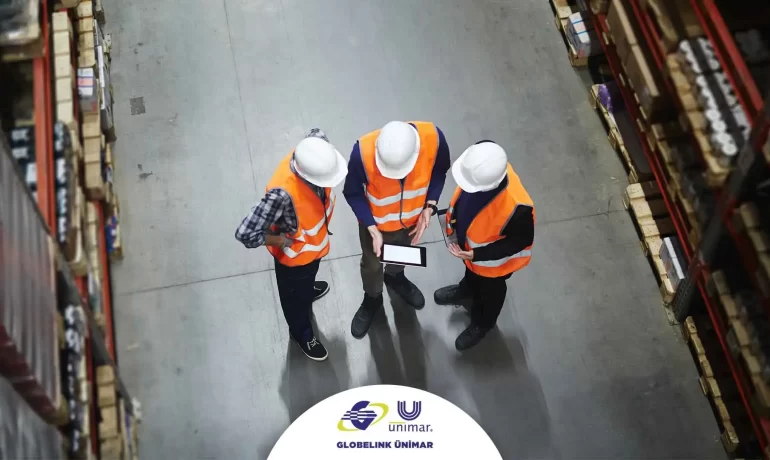
- June 30, 2021
- Blog
Liability for compensation for damage is one of the most important risks for carriers and freight forwarders. It is important that they delegate this to insurance companies through a domestic or international carrier or freight forwarding organization liability insurance contracts and regulated policies.
Carriers and freight forwarders, who are also subject to the carriers act, are in a similar position in terms of possible liability risks during the carriage. However, there are differences in terms of the beginning and ending time of the responsibility processes, and the reason for this is the differences at the beginning and ending time of the process in which the good is possessed. According to this, the carriers must have knowledge in terms of “carrier liability risks” and freight forwards must have knowledge in terms of “freight forwarder liability risks” and obtain the necessary insurance guarantees accordingly.
Considering the domestic carriages, the reasons of liability regulated in the TCC No. 6102 Art. 1178 and its following provisions in terms of ocean carriers, in TCAC Art.120 and its following provisions in terms of air transport, TCC Art.875 and its following provisions in terms of all transport modes in general and especially, road transport are regulated in almost the same way, as liable for losses, damages and delays.
In international transport, the situation is the same in COTIF-CIM provisions, CMR provisions, and Montreal Convention provisions. In other words, the main reasons for liability are in national and international transportation are considered as loss, damage and delay, including loss.
In this context, the general liability reasons of both the carrier and freight forwarders are based on loss, damage and damage caused by delay.
The Quality of Liability in Terms of Fault
Regardless of the transportation mode and the transportation route, if there is any damage in the transportation act, the responsibility is essential unless the carrier proves he acted with care and diligence. However, while it is possible to avoid responsibility by proving that there is no fault, and even no intent and negligence in sea transport, even the smallest negligence is considered a fault in other transportation modes. In fact, it is possible to avoid responsibility by proving the faultlessness in air transport only for delay damages. In air transport, it is possible to avoid responsibility for cargo damages only for reasons that are determined as four separate reasons for a limited number of reasons. In modes other than air transport, these salvation possibilities are counted as special in many more.
On the other hand, in the case of intentional fault or an act that can be considered intentional, the carrier or the freight forwarder cannot benefit from limited liability other than air transport. In other words, if the fault is severe, the liability becomes unlimited in a way that it will cover the entire amount of damage. In air transport, however, the liability remains limited regardless of the fault.
As for limited liability amounts, if there is no intentional or equivalent fault, limited liability is limited to 2 SDR per unit gross kilogram or 666.67 SDR per unit in sea transport, 8.33 SDR per unit gross kilogram in road transport, 17 SDR in rail transport, and 8.33 SDR in multimodal transport provided that the fault is determined according to the degree in which it occurred when the degree is not detected. However, in air transport, the liability is limited to 22 SDR per kilogram of gross damaged or lost cargo, regardless of the degree of the fault.
As can be seen, whether there is a fault or not, he is responsible for the faults of the carrier men, assistants, vehicles, vehicle suppliers as long as it is not proved to be a complete defectless condition or one of the reasons mentioned, and unlimited full compensation liability arises in case of negligence limited, intentional or equivalent defect.
On the other hand, in the event of a “special interest right to freight” notification or a specific liability limit that exceeds the limited liability limits, the liability may increase up to the declared interest in all transports, regardless of the transport mode. This is frequently used in air transport, as it is always possible to declare a “special interest” or a liability limit higher than the legal limit, acting within the freedom of the contracting parties. In other transportation modes, such a determination is encountered only in project loads or qualified commodity transportation.
Insurance Requirement Within the Scope of Damage and Indemnity Liability
Indirect damages are compensated for delayed damages. Losses and losses arising from damage, which are more common in practice, must be direct commodity damage. However, the costs incurred for the repair and reduction of the damage will also be calculated among the damage losses. Apart from that, damages are not subject to compensation as transportation damage. It has been determined in both national legislation and international regulations how and by what values the loss will be calculated.
The way to eliminate this risk for the carriers and freight forwarders who are under the risk of compensation liability to be calculated according to these determinations is to have liability insurance. In liability insurance, although the insured and/or the insurer is the carrier or the freight forwarder, the insured interest is not a value in its own assets. The insured interest is defined as the “risk of possible asset reduction”, that is, the risk of compensation payment. Merchants dealing with transportation with the highest care are expected to insure such risks as well. Because the compensation that is likely to be paid, whether limited or unlimited, affects the commercial activity on a significant scale.
The insurer, who provides liability insurance, should know to what extent or under which conditions he will have to pay limited liability indemnity or unlimited liability indemnity under which conditions. Thus, he will be able to measure the risk for the Premium account.
In this case, if the compensation liability of the carrier or the freight forwarder is due to the contract of carriage defined properly from the beginning or national legislation or international conventions, the insurer will have to pay this compensation to the cargo person. If he does not pay the freight person, if the carrier undertakes this, the insurer has to pay the carrier, limited to the compensation incurred.
The Scope of the Liability Insurance
Regardless of the transportation mode carried out by the carrier and the freight forwarder, the basic legal regulations in the preparation of insurance contracts and insurance policies for possible liability risks that may arise are the provisions of TCC No. 6102, Art.1473-1482. In addition, insurance policy terms are also important in determining the insurance coverage in the concrete case as an important source of law.
I would like to state that carrier or freight forwarder liability insurances are not compulsory, and as for compulsory liability insurance, the provisions are also regulated in the provisions of Article 1483-1486. These provisions are important in terms of compulsory insurance specific to the transportation of dangerous goods. However, it should be stated here that in compulsory liability insurances, the insurer will have liabilities not only to the insured but also to those directly affected by the damage; he may not be able to get rid of his payment liability unilaterally based on his commercial relationship with the insured.
In this context, the scope of carrier and freight forwarder insurances and the indemnification liability of the insurer will be determined according to the provisions of the insurance policy and insurance contract issued between the parties. In particular, the detailed regulation of risks that are included or excluded from insurance protection may be made, or generally, only legal liability risks may be included in the coverage. When liability risks other than legal liability risks are not covered by insurance or some risks from legal liability risks are not excluded from insurance protection, the reasons and scope of liability of the carrier according to laws and conventions and the liability process should be thoroughly examined.
Risks Arising from the Man and His Assistants and the Vehicle and the Supplier
It is possible to take insurance coverage for the risks arising from the man and his assistants who cause the damage caused by both loss and damage, even if the risks arising from the serious fault of these persons. In other words, risks arising from these persons may be covered by the policy on the condition that these persons do not have the right to recourse. Otherwise, only if these risks are not regulated especially, even if the insured is paid, these persons can have the right to recourse. However, by force of TCC Art. 1477, the insurer shall not be liable for loss arising out of any event for which the insured is liable if caused by intent. In that case, the opportunity of recourse to these persons cannot be excluded for damages arising from the intent of the man, the assistants and suppliers.
In the insurance policy, the serious faults of the man and his assistants, vehicle faults or vehicle supplier faults may be excluded from the policy cover. Again, special conditions for such men and assistants in terms of professional competence, financial competence or professional reputation may be regulated in the policy. For this reason, the policy should be examined carefully while being issued and the assured risks should be evaluated. If there is no provision, it will be covered by insurance as per legislation and international regulations, but the insurer will also be able to recourse to these persons.
It can be stated in the insurance policy that even if there is intent or a fault equivalent to intent, a limited liability indemnity payment will be made. This should definitely be examined and the possibility of payment of compensation exceeding the limited liability limit should be evaluated carefully, taking into account the risks that the carrier may be responsible for full compensation. Otherwise, the insurer may be far from paying the compensation that the carrier had to pay. And, if possible, if there is a framework contract concluded between the carrier and the person dealing with the freight, it can be provided to refer to all possible indemnity liability risks in the policy according to the provisions of this contract. Thus, the carrier will have no risk out of the insurance coverage.
Risks Arising from Packaging, Loading and Unloading
Although damage might occur during the transportation process, the reason is mostly due to packaging, which is the previous stage. Carriers and freight forwarders often interfere with packaging, even if they do not need to, and can use their own parcels or parcel tapes at the beginning of the transport.
In this case, the carrier goes under liability risk and as a rule, the packaging is not included among the insured liability risks. Especially, freight forwarders make commitments according to the delivery methods when the transportation contract is concluded.
This causes the loading and unloading processes to be among the responsibility risks of the carrier. If the carrier sends the contract individually to the insurer and has covered the liability risks under the terms of that contract, although such risks are also covered by the insurance, these risks may not be covered by insurance If insurance coverage is generally provided for risks annually, monthly or within a certain period.
And, if loading, unloading, and transfer risks are clearly excluded from the insurance coverage in the insurance policy, it should be known that the carrier will not be liable for any damage incurred due to risks other than supervision and surveillance, and therefore the insurance will not be liable to pay.
Even if the loading, unloading and transfer risks are excluded from the scope of liability insurance, the insurer will also be responsible for the defect arising from the carrier if there is a lack of supervision and care obligation during the delivery and delivery stages, especially in the event of contributory negligence.
The Damage Assumed by the Carrier /Arising from an Incurred Risk
Compensation payments made by the carrier for customer satisfaction are not covered by the insurance. Here, the main thing is to pay compensation for the risk that is primarily responsible for the law and the relevant convention. For this, it should be revealed that there is a legal obligation.
This does not require execution and litigation every time. With the common decision of the carrier and the insurer, a payment decision can be made taking into account the risk and the incurred damage. In this case, there is still no obstacle to payment for customer satisfaction.
Since delay damages are indirect damages, policies are limited to a certain limit. This amount generally meets the limited liability limit if limited liability is involved. However, in the absence of limited liability, the carrier may be obliged to compensate for the delay damage detected over the limit.
Exemption Clauses
The exemption amounts foreseen per vehicle during the transportation process are often above even the limited liability compensation that occurs, and the carrier cannot reflect the compensation incurred to the insurer.
While the insurance policy is being issued, it is not very important that the maximum amount is determined too high for the losses per vehicle. Except for electronic, computer or technological products and branded machinery, apparel and other products, it may be more beneficial to keep the limit per vehicle at a certain amount than to set it in millions of dollars.
However, even when you set the exemption as a thousand dollars, these payments can reach significant amounts for carriers in total although the insurer has no liability to pay these most of the time.
In the determinations of exemption per vehicle trip and ceiling liability per vehicle, the possible risks that have an effect on the premium should be especially evaluated by taking into account the types of cargo carried.
Liability Insurer Reflecting the Indemnity He Assumes: Recourse
A liability insurer will only make a correct payment if the insured pays the freight person, the freight insurer or the insured carrier paying the freight person. The carrier and liability insurer are jointly responsible to the person dealing with the freight or the cargo insurer as per TCC Art.1478. Most of the time, the cargo insurer may have paid the amount that the carrier or liability insurer has to pay much more than the indemnity. Because, as a rule, the cargo insurer is responsible for full compensation while the carrier liability insurer is responsible for the limited liability compensation. Liability insurer, who pays the compensation according to his liability policy as well as the carrier is liable, shall legally succeed the insured upon payment of the insurance indemnity as per TCC Article 1481.
The insured does not have the right to claim compensation for recourse before the damage is detected and without determining whether the injured actually has a loss or a claim for compensation. In other words, since the carrier is liable to pay and he eventually pays, he is the holder of the insured interest. The insurer shall not be able to receive a claim for compensation that has not addressed him, as if it were his own damage. It is not even clear yet whether there is a freight person or a freight insurer demanding compensation for the insured’s successor. For example, while the freight person does not claim damages, does not exercise his right of the legal claim, or even explicitly waives it, there will be no indemnity that the liability insurer can recourse on the basis of succession by making a payment to the carrier.
Unless otherwise is issued in the insurance policy, the employee of the insured cannot be recourse to the man and his assistants. If there is no special prohibition clause in the insurance policy, sub-carriers, subsequent carriers, sub-brokers and their men and their assistants during the execution process and their assistants and liability insurers, if any, can also be recourse. For this, it should be revealed that they have liabilities according to the underlying legislation or international regulations.
Conclusion
The transportation process is at the top of the logistics operations. This is a process that includes the risks of loss, damage and delay, and when such risks occur, the damage is inevitable. Liability for compensation for damage is also one of the most important risks of carriers and freight forwarders. It is important that they delegate this to insurance companies through domestic or freight forwarding organization liability insurance contracts and regulated policies.
Liability insurance transfers to the insurer the risks of the carriers and freight forwarders under the risk of liability, which are likely to fail to comply with the highest diligence measures. Although insurance premium payments are important cost elements here, liability insurance should be considered from the very beginning in terms of transportation process and process management should be carried out by examining the limits and exemptions per trip.
Artificial Intelligence is Both Changing and Transforming
Today, we can see the clues that we will
The Future of the Cargo Market is Shaped by e-commerce
The e-commerce industry has been growing rapidly since the



